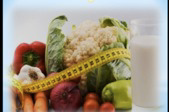
There’s no doubt that smart training helps prevent injuries. But so will a
wholesome diet, filled with foods that will enable your body to mount a strong
defense against muscle strains and tears. Here are three nutritional strategies to
prevent injuries:
1. 
How do you know if your body needs more calories?
Keep track of your weight and eating patterns. If your
weight fluctuates for no apparent reason, or if the
quality of your eating is sporadic and generally
unhealthful, you should consider a slight increase in
high-quality calories.
If really concerned about eating enough but not too
much talk to one of us at Total Health Systems about the Resting Metabolic Rate
Test and Exercise Metabolic Test. These two tests will give us a very accurate
picture of how many calories exercising and how many calories you burn at rest.
We can then determine how many calories you should be eating.
2. Pile on the protein. True, a high-carbohydrate diet will fuel your running. But
many runners take this advice to the extreme, living on bagels, pasta, and energy
bars. Besides carbohydrate, you also need 80 to 100 grams of protein a day to
maintain your muscles and other soft tissues. A small 3-ounce serving of chicken
provides about 25 grams of protein, a glass of milk 10, a soy burger 14, and a
hard-boiled egg 6. If you’re only eating one protein source a day, you’re not
consuming enough. Try to include some protein in every meal.
3. Don’t forget zinc and iron. Runners often skimp on these two important trace
nutrients found predominantly in red meat. Though research hasn’t linked zinc and iron deficiency with increased injury rates. You need 15 milligrams of zinc and 18 milligrams of iron a day. Most runners don’t consume nearly that much,
which is why it is recommend that you eat a zinc and iron-fortified breakfast
cereal or take a multivitamin that contains both minerals. Foods that are good
sources of both zinc and iron include lean beef, poultry, seafood, and lentils.
Of course look for what I like to call “Happy Cows”, “Happy
Chickens”, and “Happy Eggs” . This means that cows and
chickens there were roaming free eating grass not being shot

